November Actions in Defence of Rights
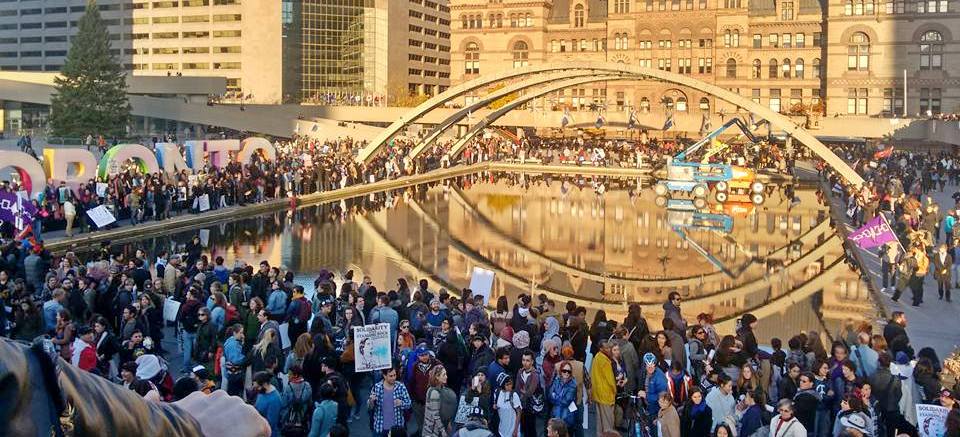
Toronto rally in support of Standing
Rock, November 5 (F. Walker)
Actions in Defence of Rights
Rally Condemns 8th Annual Halifax
International Security
Forum
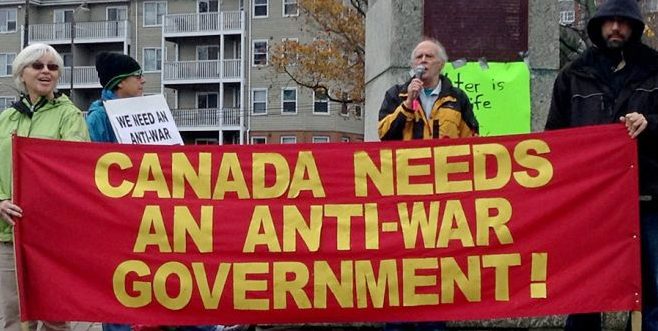
Allan Bezanson speaking at Rally, November 19, 2016.
Halifax's dedicated anti-war activists once again made
clear that Halifax is "No Harbour for War," with a militant
protest on the occasion of the annual conference of warmongers,
the 8th annual Halifax International Security Forum.
Every year, this Washington, DC-based organization
imposes
itself on Halifax, to give the false impression that Canadians
aspire to be a better junior partner to U.S. imperialism, NATO
and their war crimes. Far from it. As the recent celebration of
25th anniversary of the film "No Harbour For War" shows, it is
the people's resistance to imperialist war and aggression that
sets the tone.
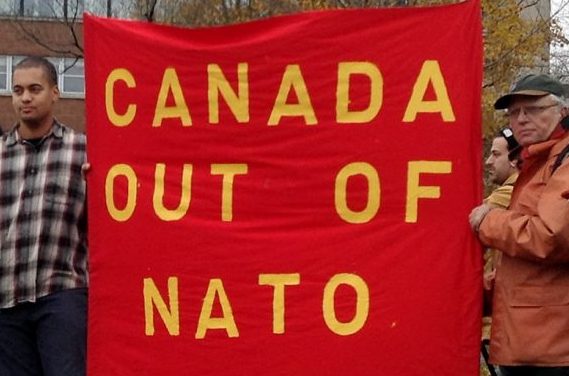
"One of our purposes is to build the anti-war movement,"
said
Allan Bezanson, an organizer with the group No Harbour for War
that called the action. "But there are so many provocations, be
it pipelines, NATO or this forum." Regarding the election of
Donald Trump as the next president of the U.S., Allan pointed
out, "We know what we were going to face with Hilary Clinton, it
remains to be seen what we'll face with Trump. [But i]t doesn't
matter who is in power in the United States, they are going to
organize these provocations against the world's people."
The protest against the HISF was again held at
Cornwallis
Park, across from the site of the HISF at the Westin Hotel. The
park is named after the founder of the city who is infamous for
putting a bounty on Mi'kmaq scalps. Once again, protesters
covered his statue and put up sign with the name of the park
replaced with "Halifax Peace and Freedom Park." Brad Fougere, one
of the two people who covered the statue, said the police seemed
"more concerned with the integrity of [Cornwallis'] violent
colonial legacy than with our democratic right to challenge that
colonial legacy."
Mi'kmaq elder Billy Lewis asked the pointed question,
"Security for who?" He added that, "Whenever you hear the word
‘security' you better start ducking."
Halifax's former poet-laureate El Jones read a poem she
had
written for the occasion, which said in part, "Welcome to the
planning sessions of the humane war. These days we don't call it
humane war, we call it invasion, we call it responsibility to
protect."
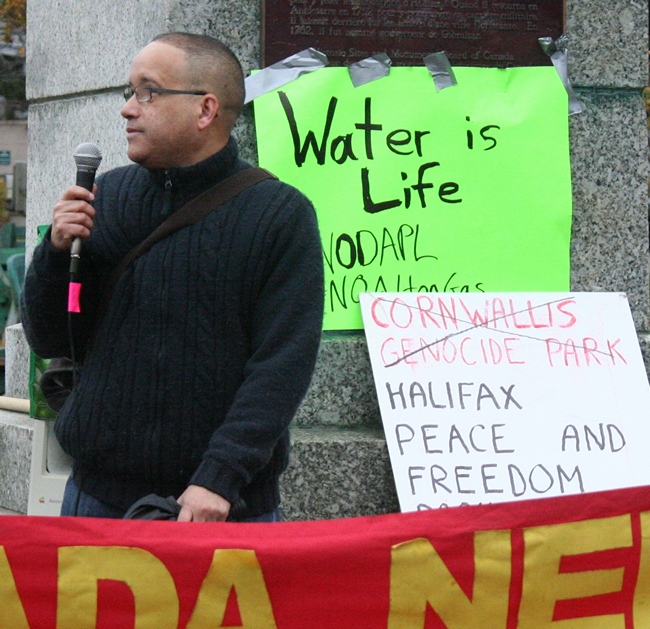
"All these struggles, the Indigenous struggle, the
struggle
against the war on black lives, in the U.S. and here, the
struggle against misogyny, the struggle for a decent economy, the
struggle against capitalism, which is central, all of these
struggles are inter-connected," said Professor Isaac Saney. "We
are fighting for a world not only fit for us, but for those who
come after us." He denounced the HISF participants as warmongers
who are plotting against the peoples of the world and gather in
Halifax "under the guise of peace."
As protestors pointed out, the conference brought in
various war criminals and arms dealers, as well as corporate
CEOs, pundits and monopoly media journalists to hold forth.
Participants expressed the need to step up the work to make the slogan
of the anti-war, anti-imperialist movement in Halifax -- No Harbour for
War -- a reality and prepare the conditions for an anti-war government.


Toronto Rally and March Demand Housing
as a Human Right
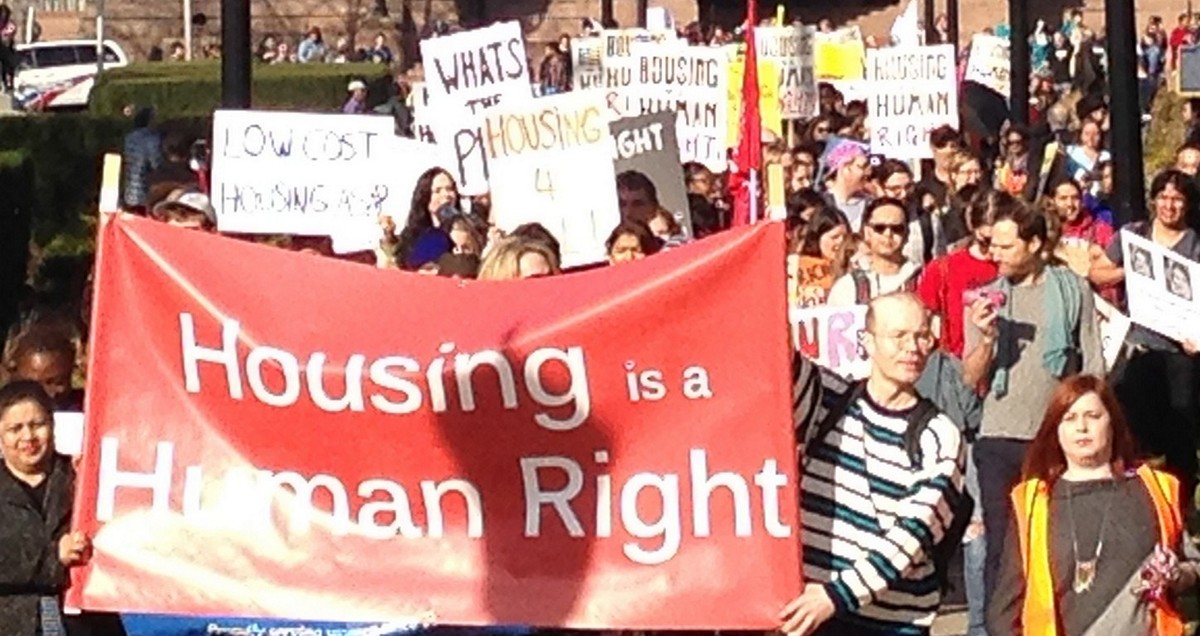
Hundreds of people rallied at Queen's Park in Toronto
on
November 18 as part of the National Housing Day of Action to
demand recognition of housing as a human right and a national
strategy to provide it with a guarantee. The action was supported
by organizations across the Greater Toronto Area and Southern
Ontario that fight for the right to housing and in defence of the
most vulnerable.

Canada is a signatory to the 1976 United Nations
Covenant on Economic, Social and Cultural Rights which recognizes
housing as a human right, but has not had even the pretense of a
national housing strategy for decades. The Trudeau Liberal
government says it is working towards such a strategy, and
released the results of a national housing strategy consultation
on November 22. The rally emphasized that what is needed is not
empty policy objectives, but immediate action to provide the
right to affordable, adequate housing with a guarantee.
Ubana Khalid and Dawn Marie Hairiott, the emcees of the
event
called for measures to address the housing crisis that exists in
Canada. This year, they pointed out, the United Nations reported
that Canada is in violation of its commitments under the Covenant on
Economic, Social and Cultural Rights.[1]
In its review, the UN Committee on Economic, Social and
Cultural Rights noted a shortage of low-income housing units,
lack of homelessness prevention and shortage of shelters, and the
brutal housing conditions of Indigenous peoples. The key problem,
they said, was the failure of the government to even address
these issues.
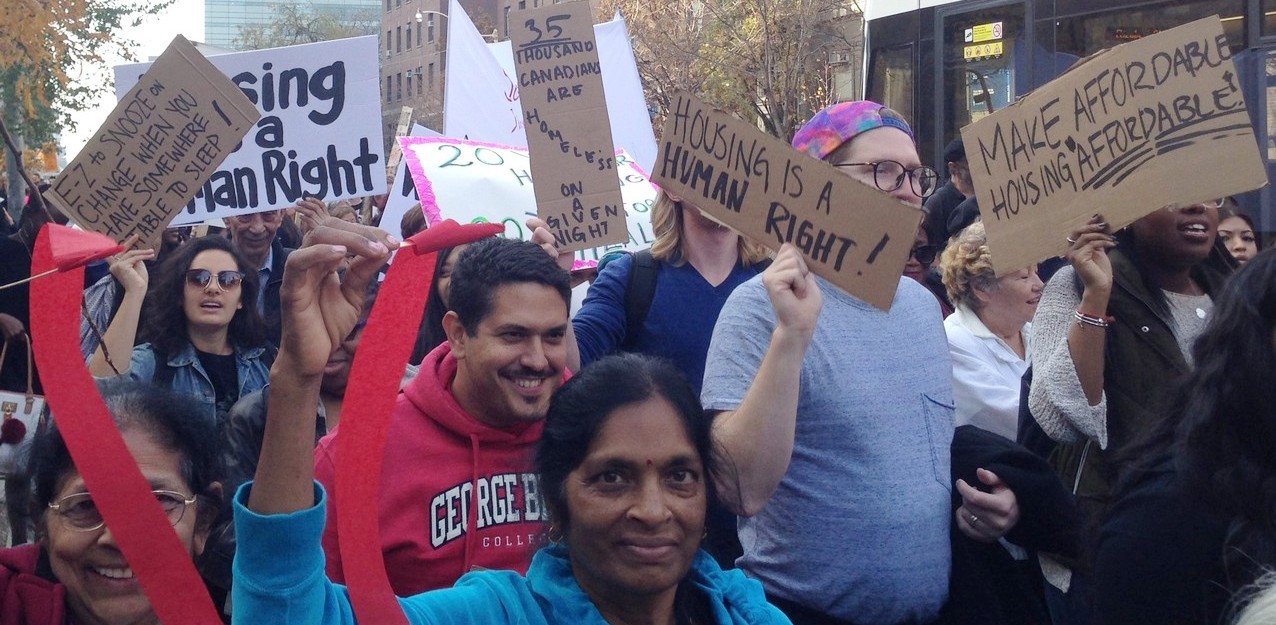

Speakers shared their personal experiences with lack of
access to affordable, adequate housing. A representative of the
Workers Action Centre pointed out that many people require
multiple jobs to meet housing costs and with a minimum wage of
$11.40 per hour are still living below the poverty line. She said
that as a university student she was forced to spend months
living in shelters while looking for housing. After graduating,
her wages were not enough to start paying her student debt, which
in turn was used to discriminate against her in finding
housing.
An
advocate for supportive housing spoke of his personal experience
with homelessness and mental health issues. While he said that he
felt fortunate to have eventually found supportive housing, where
he has spent the past six years, he said the need for supportive
housing is far beyond what is available. Some 11,000 people in
Toronto alone require such support, he said.
An Ontario Disability Support Program (ODSP) recipient
said
more than 15 per cent of Canadians with disabilities are forced
to live in poverty and are in need of safe, affordable, adequate
housing. When Canadians speak up for affordable housing for
people with disabilities they are speaking up for members of
their own families, friends and neighbours and members of their
community, the speaker said.
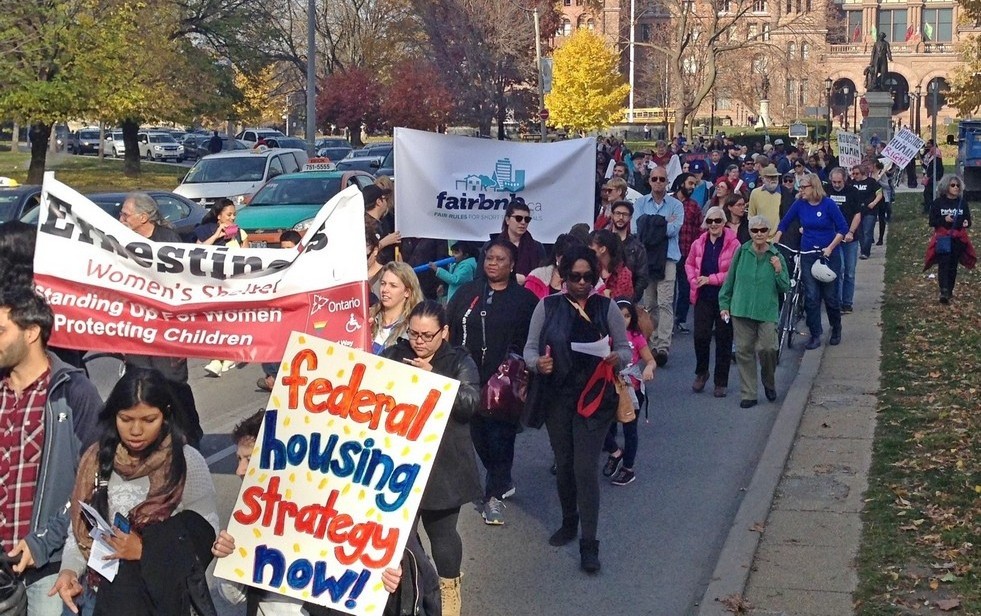
The rally then marched through downtown Toronto,
calling out
the slogan Fight! Fight! Fight! Housing Is a Human Right!
The march ended at Holy Trinity Church, home to a permanent memorial to
the hundreds who have died in
Toronto living on the street without adequate shelter or
housing.
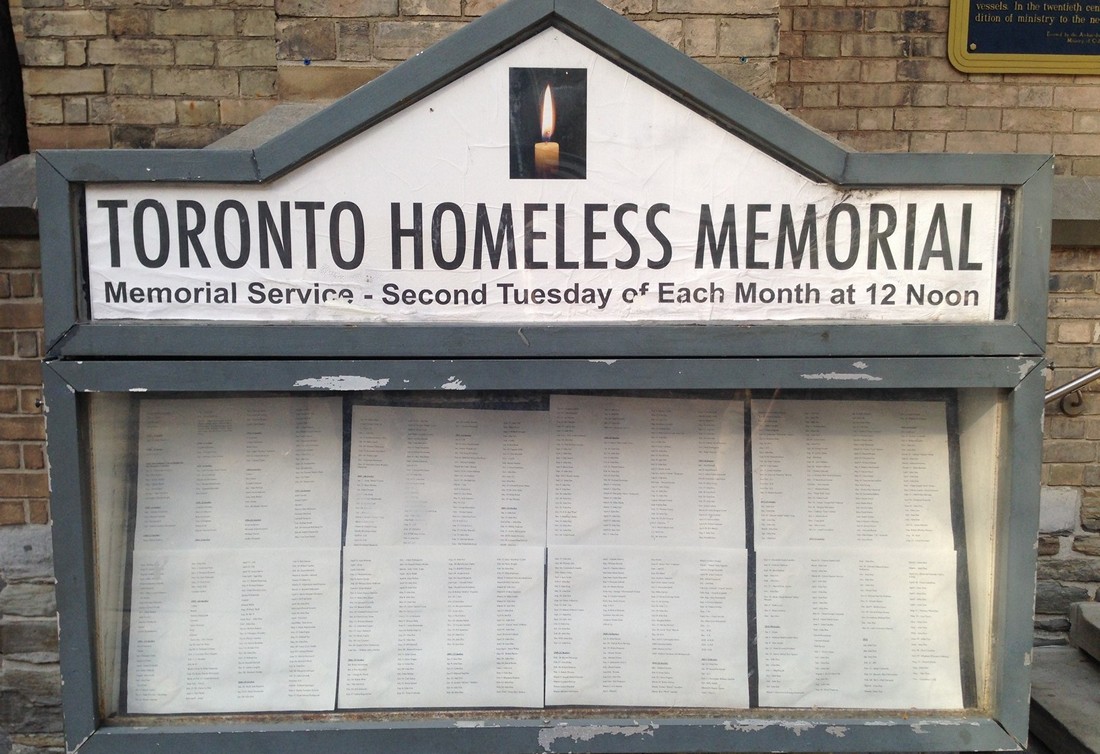
Note
1. See R2H Coalition submission on
a national housing strategy here.
2. "New
UN
report
slams
Canada
for
persistent
housing
&
homelessness
crisis"

Carleton
Students
Oppose
University's
Involvement in Criminalizing Dissent
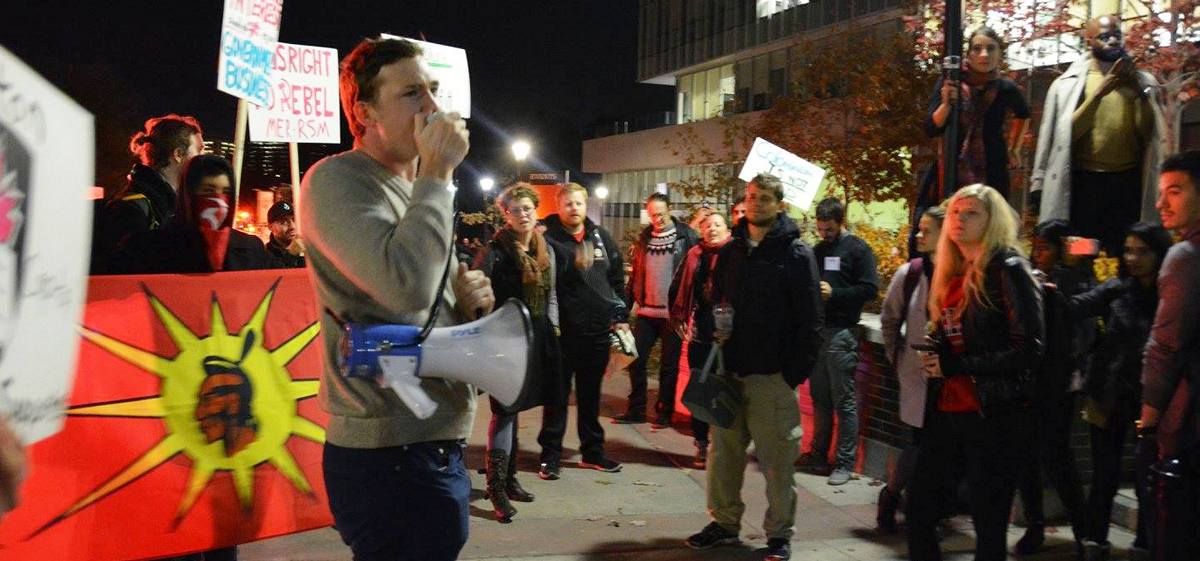
Indigenous sovereignty is not
terrorism! Our
rights and future are not for sale!
Our security lies in our
fight for the rights of all!
Students and community members mobilized on November 15
to
protest the closing event of the "2016 Symposium on Security and
Infrastructure Resilience" sponsored by Carleton University and
its "Infrastructure Resilience Research Group" (IRRG). The
Symposium brought together CSIS agents, judges, private security
experts and representatives of big energy monopolies to discuss
"The Challenges of Dealing with Natural Resource Development
Projects and Activism."
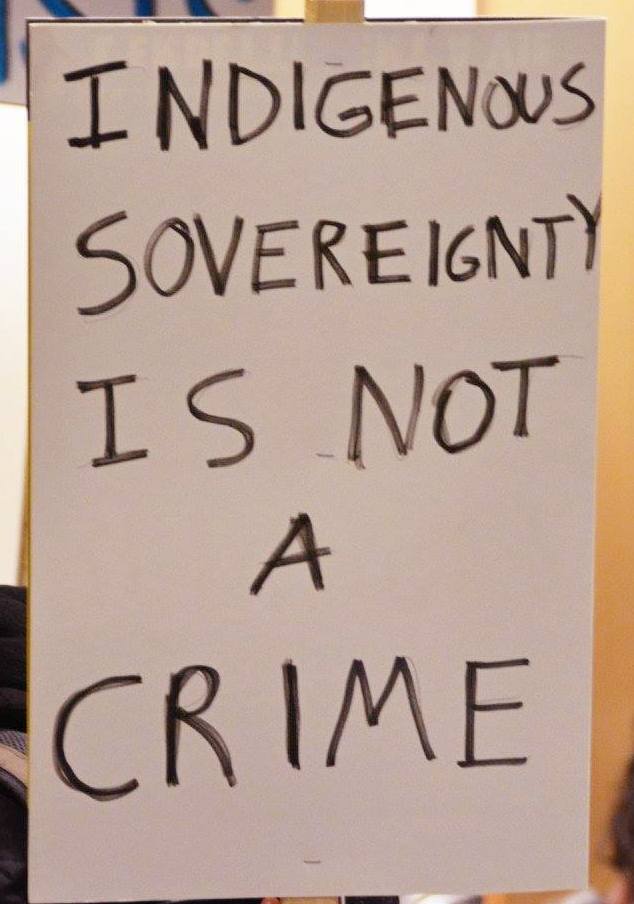 The purpose of the
Symposium was to
train "prosecutors, lawyers, regulators, law enforcement,
industry and industry association representatives" in how to use
police powers and black ops against "protests targeting critical
infrastructure." The two-day Symposium featured five workshops on
"the threat environment, relevant legal provisions in the Anti-Terrorism
Act [Bill C-51] and other pertinent
elements of the criminal code, the prosecutorial experience in
cases involving violent acts targeting critical national
infrastructure, the adjudication record, and overall lessons
learned." The closing event was a Dean's Lecture on campus
featuring a federal court judge, a former CSIS deputy director
and a cybersecurity expert.[1] The purpose of the
Symposium was to
train "prosecutors, lawyers, regulators, law enforcement,
industry and industry association representatives" in how to use
police powers and black ops against "protests targeting critical
infrastructure." The two-day Symposium featured five workshops on
"the threat environment, relevant legal provisions in the Anti-Terrorism
Act [Bill C-51] and other pertinent
elements of the criminal code, the prosecutorial experience in
cases involving violent acts targeting critical national
infrastructure, the adjudication record, and overall lessons
learned." The closing event was a Dean's Lecture on campus
featuring a federal court judge, a former CSIS deputy director
and a cybersecurity expert.[1]
"Critical infrastructure" in this case refers to
enormous
resource development projects such as the $9 billion Site C Dam
and $11.4 billion Pacific NorthWest LNG project in British
Columbia and the $3.7 billion Dakota Access Pipeline in the
United States which are facing opposition from Indigenous nations
and concerned citizens.
The moderator of the Dean's Lecture,
Carleton "Distinguished Research Professor Emeritus" Martin
Rudner, was quoted by the Globe and Mail on November 14
about the reasons for holding the Symposium, which he declared to be
"domestic extremists." Rudner's example as paraphrased by the Globe
was "incidents such as the confrontation three
years
ago between First Nations demonstrators and RCMP in New Brunswick
over proposed shale-gas drilling" and "more militant elements in
the indigenous and environmental communities." Rudner even
claimed that Iran may be sponsoring "groups that oppose Canadian
resource projects."
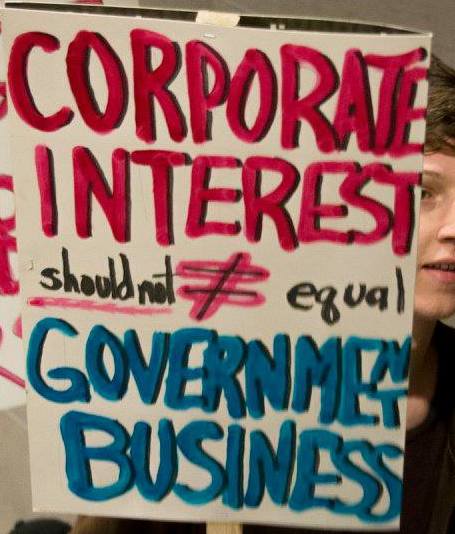 An open letter issued by
students a day after the protest
noted, "Activities carried out by the IRRG are not academic and
have no place on university campuses. Political problems require
political solutions. They require a political process that
recognizes Indigenous peoples' sovereignty and rights. Attention
should be given to solving problems on a nation-to-nation basis
rather than suppressing Indigenous voices." Inside the event,
Rudner dismissed the students' actions as a "violent protest" and
said that the IRRG and the exercise of police powers was to
"protect Aboriginal people from themselves," the letter said. An open letter issued by
students a day after the protest
noted, "Activities carried out by the IRRG are not academic and
have no place on university campuses. Political problems require
political solutions. They require a political process that
recognizes Indigenous peoples' sovereignty and rights. Attention
should be given to solving problems on a nation-to-nation basis
rather than suppressing Indigenous voices." Inside the event,
Rudner dismissed the students' actions as a "violent protest" and
said that the IRRG and the exercise of police powers was to
"protect Aboriginal people from themselves," the letter said.
Students noted that the "critical
infrastructure" projects that the IRRG is concerned with are not
those critical to the people's well-being, the country's energy
needs or the overall health of the economy. They are projects
requiring massive state and private investment that are not seen
as legitimate and seen by large sections
of the people to pose serious dangers. As a result, police powers are
deployed to defend
the projects and the transportation and sale of resources.
As projects being proposed or
built on the territory of
Indigenous nations, they are being built without the consent of
the sovereign peoples of those jurisdictions. Many Indigenous
peoples and Canadians also object to the process for approving
such projects, the potential for environmental devastation and
the fact that the main beneficiaries will be the powerful private
interests given ownership and control. Rather than promoting
political solutions on a nation-to-nation basis or recognizing
the need for a new direction for the economy, people's opposition
and concerns are reduced to an issue of law and order and people
are defined by the police powers as "terrorists," "extremists"
and "threats to national security."
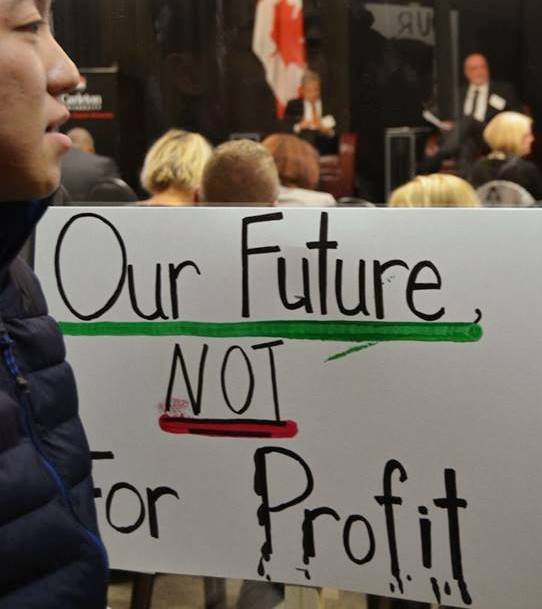 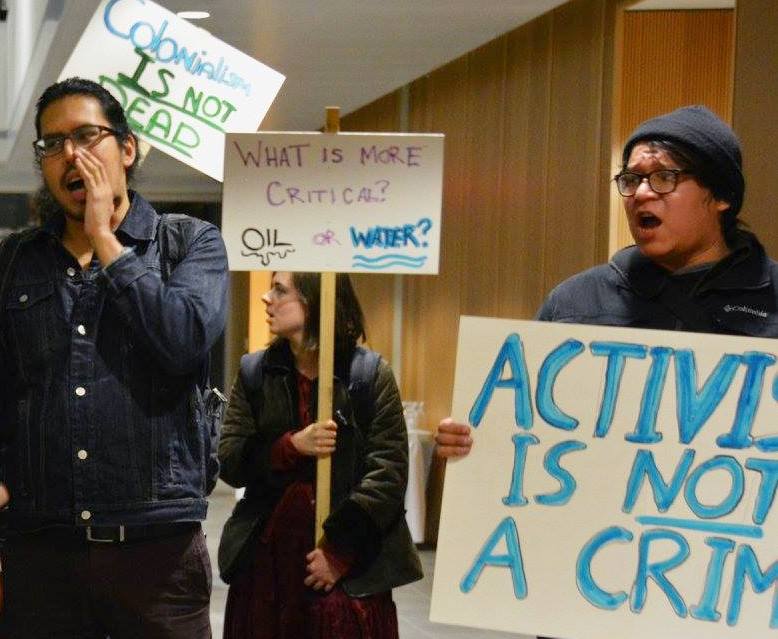
To oppose the university being used for this
illegitimate
aim, students vigorously protested, chanting and demanding the
event be shut down and its participants leave campus until they
complied and ended the event prematurely. The students' message
was "Indigenous sovereignty is not terrorism, protestors are not
criminals, and activities such as the IRRG Symposium are not
welcome at Carleton University." Within four days of the protest,
the IRRG had removed any record of the event from its website, as
well as the names and biographies of any individual involved in
the program. Students are holding further discussions on how to
hold the university to account for supporting the IRRG and defend
the rights of all.
Note
1. The judge, Simon Noel was
responsible in 2010 for upholding the "reasonableness" of the
security certificate and plans for deportation to torture of
Ottawa resident and refugee from Algeria Mohamad Harkat. Justice
Noel's ruling was based on police accounts of taped telephone
conversations, the transcripts of which were destroyed by the
police. Harkat had been detained without charge from 2002 to 2006,
including one year in solitary confinement at the
Millhaven prison in Ontario in a facility dubbed Guantanamo
North, built specifically for those held under security
certificates. Harkat and defenders of rights are currently
fighting the latest attempts of the Liberal government to deport
him.
For background see "Mohamed Harkat Condemned
by a Secret
System of ‘Justice,'" Mattew Behrens, TML Daily, December 24, 2010.

Canadian Demonstrations Uphold Rights of
Resisters at
Standing Rock and
Sovereignty of Indigenous Nations
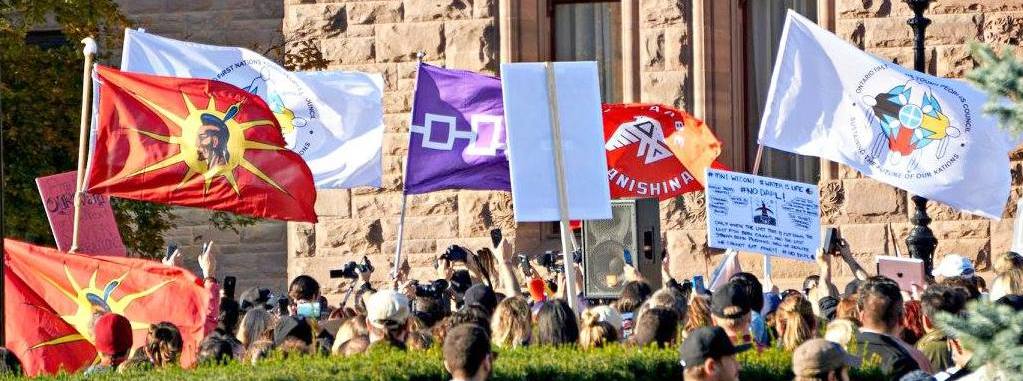
People across Canada and Quebec have stepped up their
actions in solidarity with the Standing Rock Sioux land and water
protectors and their supporters in North Dakota. Mass actions have been
held
in Halifax, Montreal, Toronto, Hamilton, London, Sudbury and Calgary in
solidarity with the courageous
struggle of the Standing Rock Sioux and their supporters in defence of
their sovereignty, their unceded land and water against the Dakota
Access Pipeline (DAPL). People from all walks of life took part:
members of First Nations, students from high schools, colleges and
universities, community organizations fighting in defence of the
environment and other concerned people.
 Elaborating the slogan
"Water Is Life," actions affirmed that Indigenous peoples across Turtle
Island will not conciliate with the pillaging and polluting of water
and soil by energy and mineral monopolies, nor permit violation of
their rights, including the right to say No. Elaborating the slogan
"Water Is Life," actions affirmed that Indigenous peoples across Turtle
Island will not conciliate with the pillaging and polluting of water
and soil by energy and mineral monopolies, nor permit violation of
their rights, including the right to say No.
The actions expressed profound solidarity based on
common struggle to hold governments to account to honour their treaties
with Indigenous Nations, to right historical wrongs, for political
solutions based on nation-to-nation relations, rejection of the use of
force and state violence against those affirming their rights, and
opposition to monopoly right to wreak havoc on the social and natural
environment. Participants pointed to the involvement of three Canadian
banks in funding the DAPL -- TD, RBC and Scotia Bank -- and demanded
they divest themselves immediately.
Speakers at all the actions denounced the Trudeau
government for carrying on business as usual in its relations with
Indigenous peoples. For example, an Elder at the Toronto rally demanded
to know how is it possible that despite Liberal promises, close to 90
First Nations communities are still under long-standing boil-water
advisories one year after the new government took office? Nor has the
Trudeau government done anything meaningful to address the missing and
murdered Indigenous women and girls, she said.
Camp at Mercier Bridge, Montreal, October 31
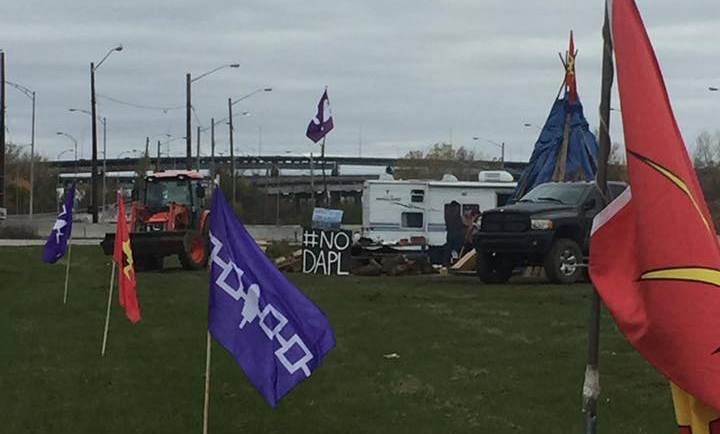
Tyendinaga Mohawk Territory, October 31
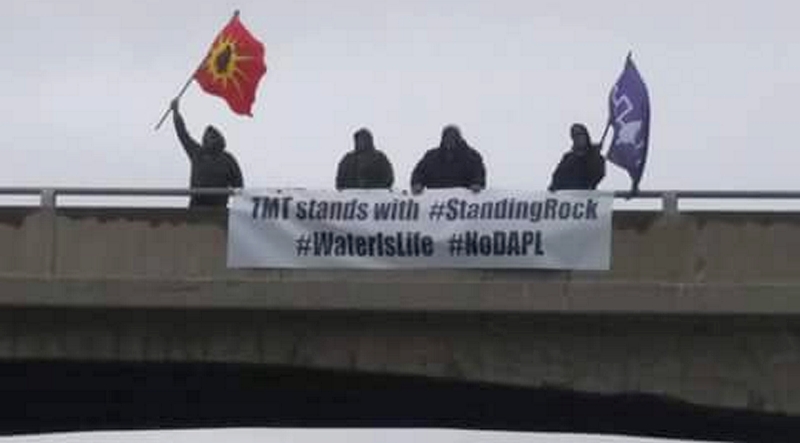
Halifax, November 3
Sudbury, November 3
Regina, November 3
Toronto, November 5
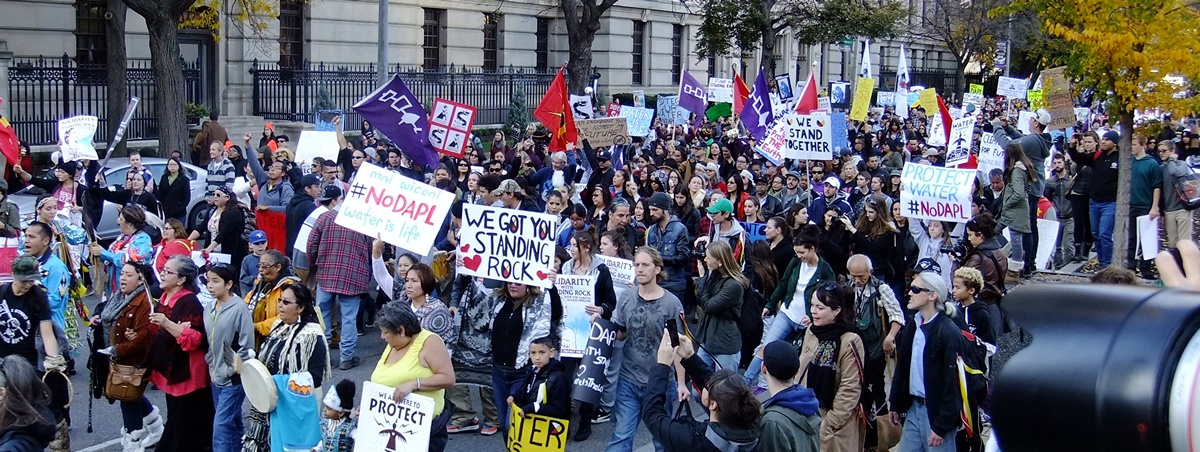  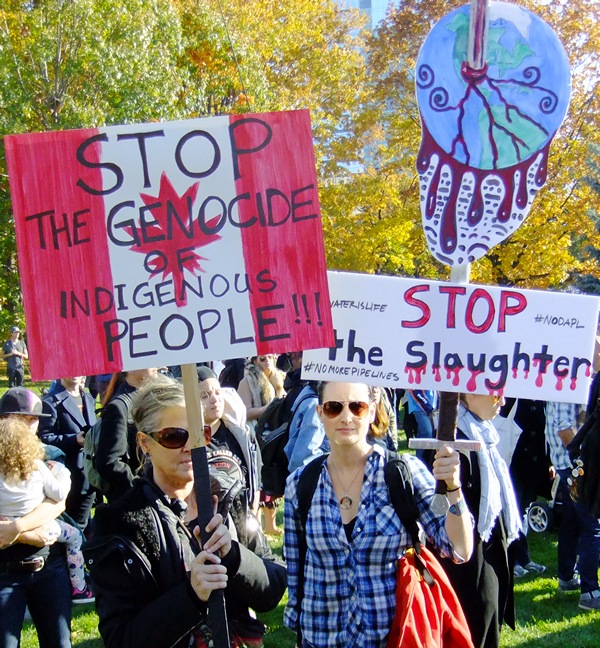 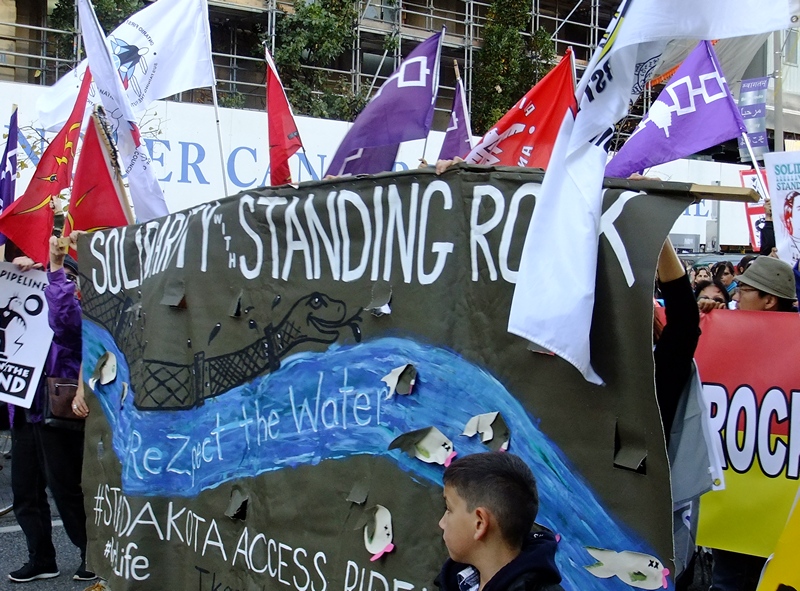
 
  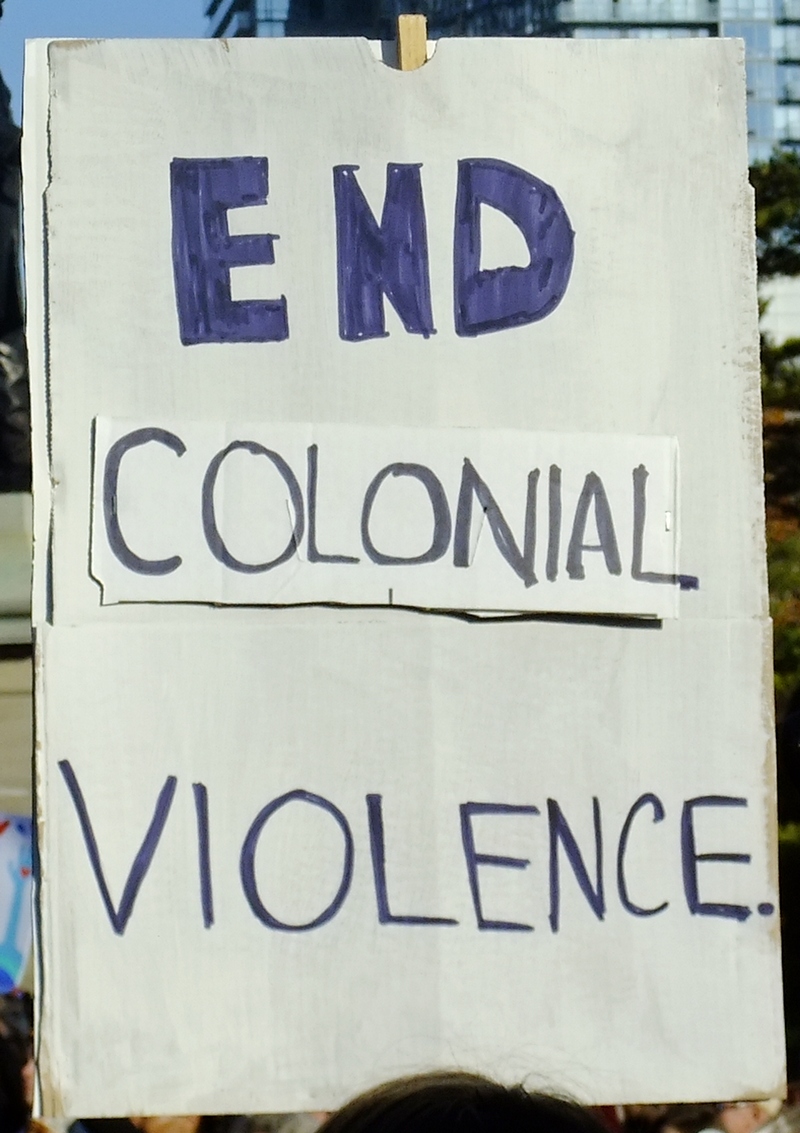
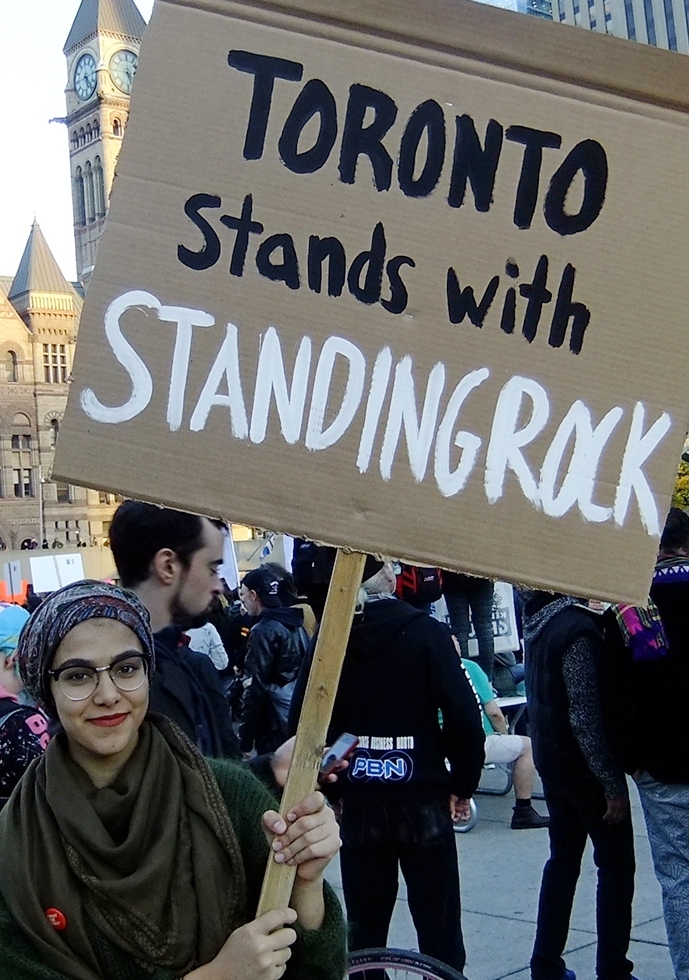 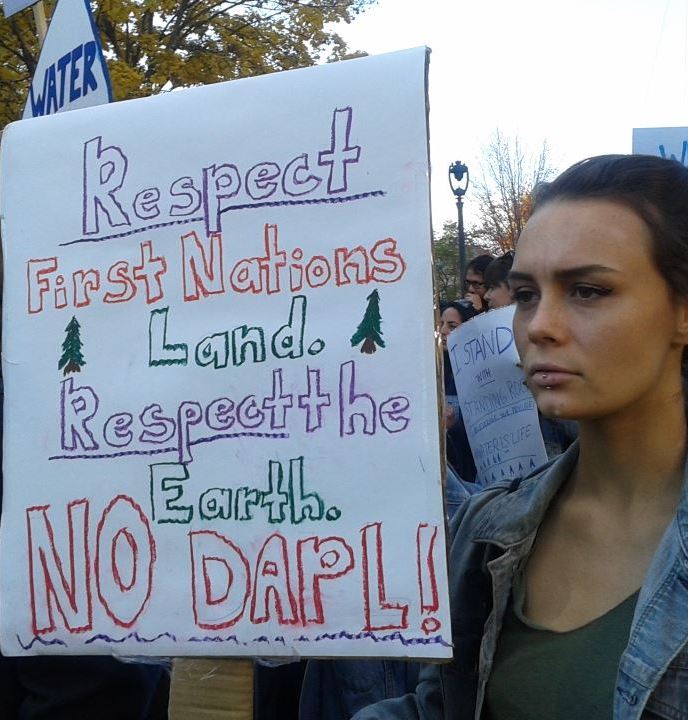 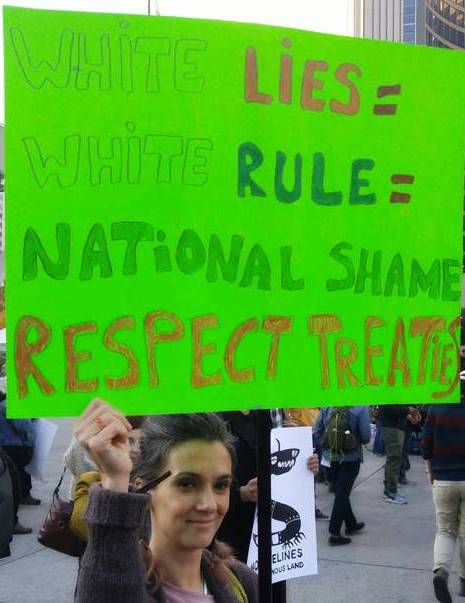
Calgary, November 6
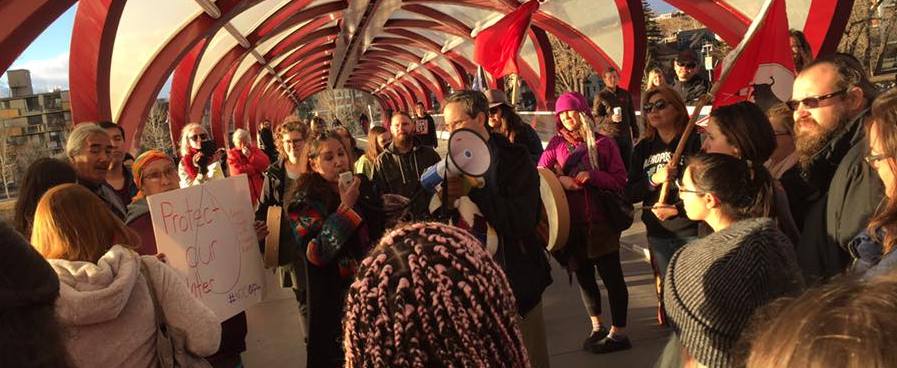
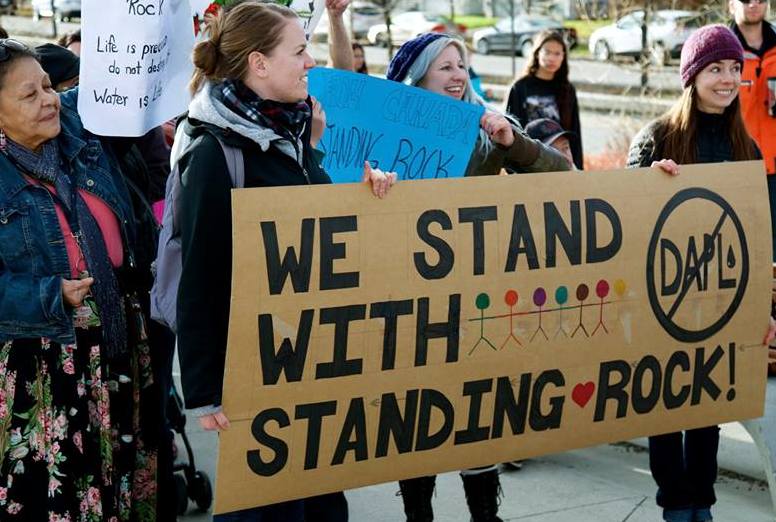 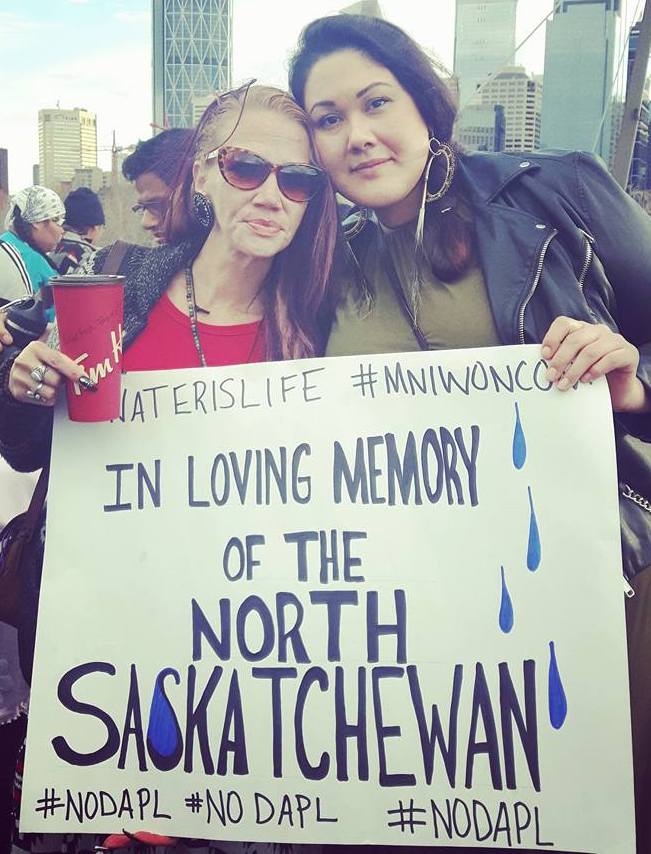
Six Nations, Brantford, November 6
Hamilton, November 7
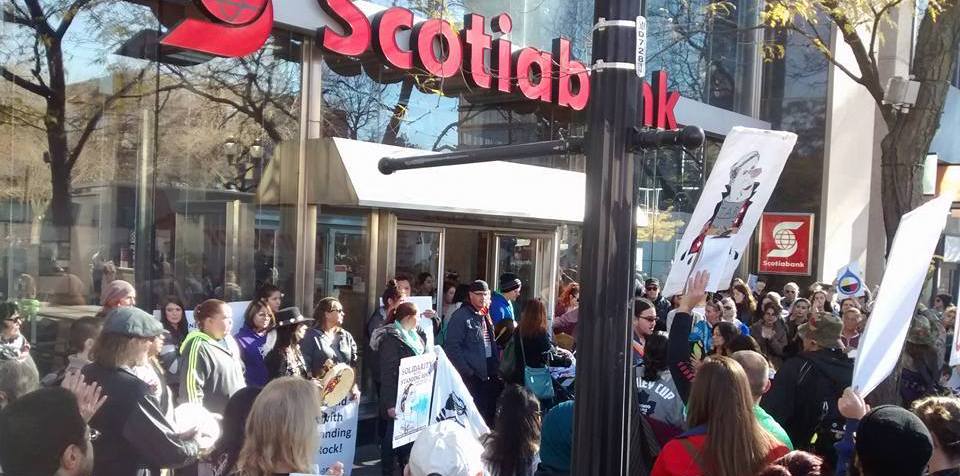 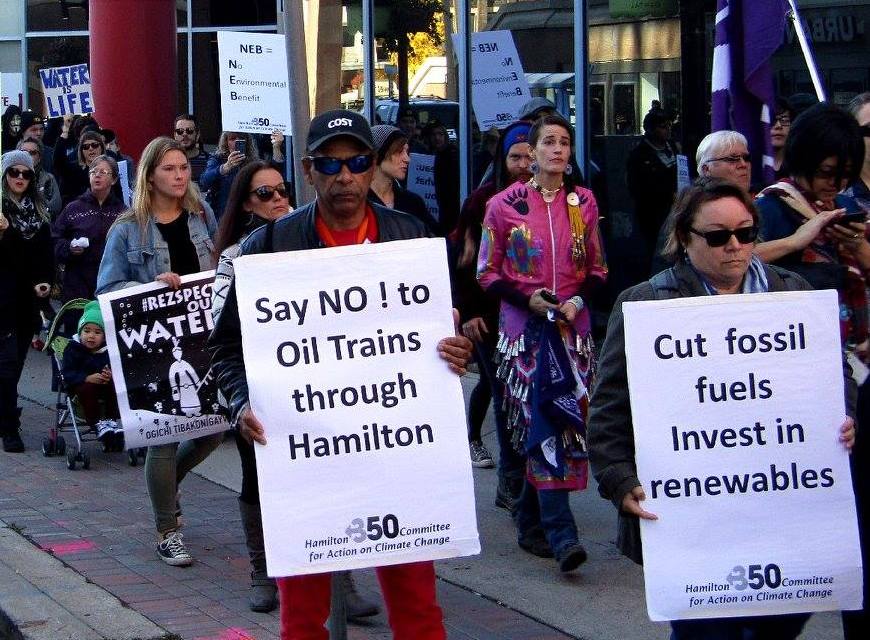 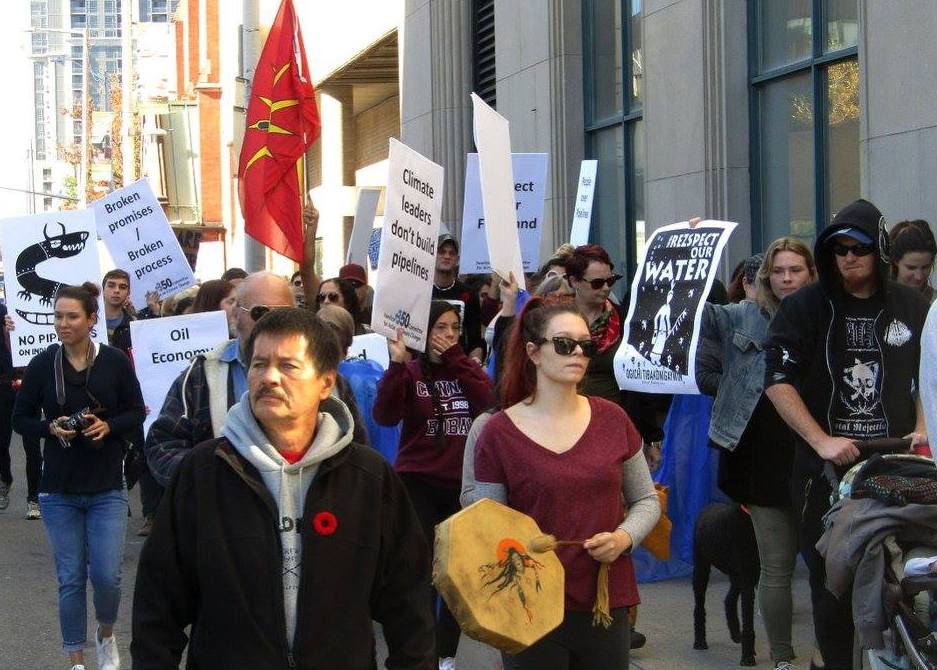
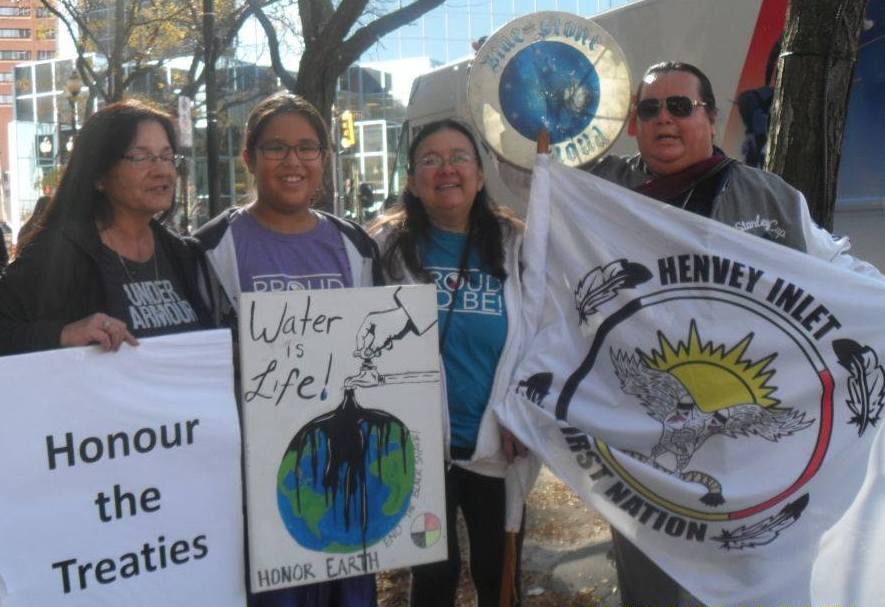 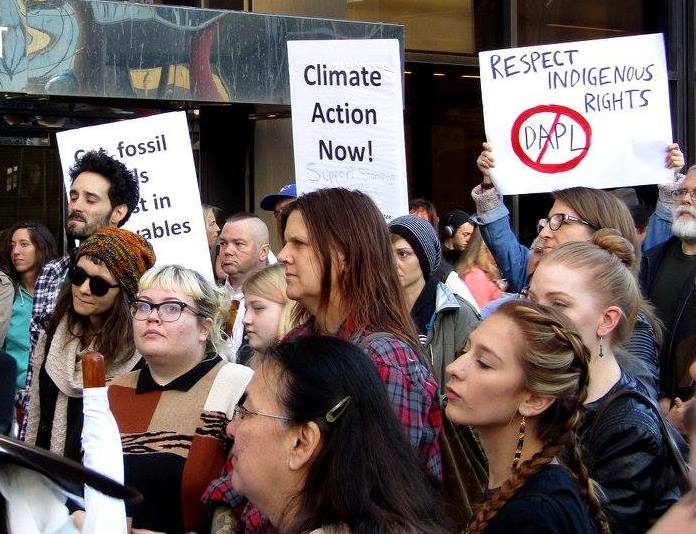 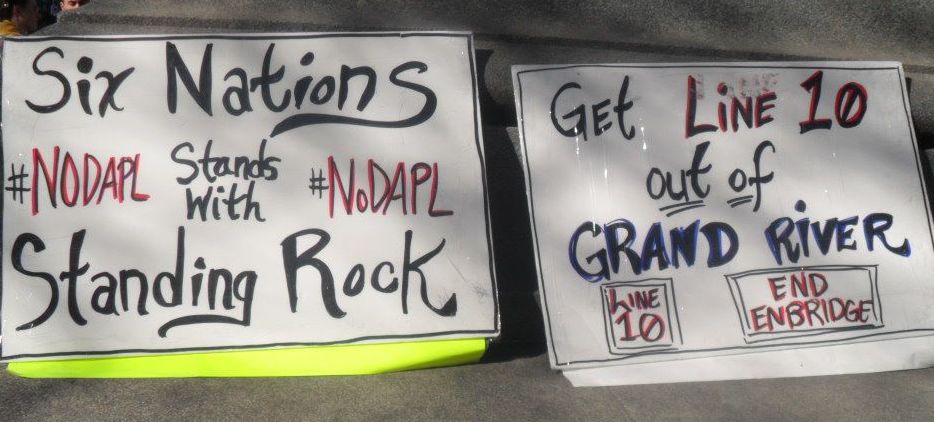 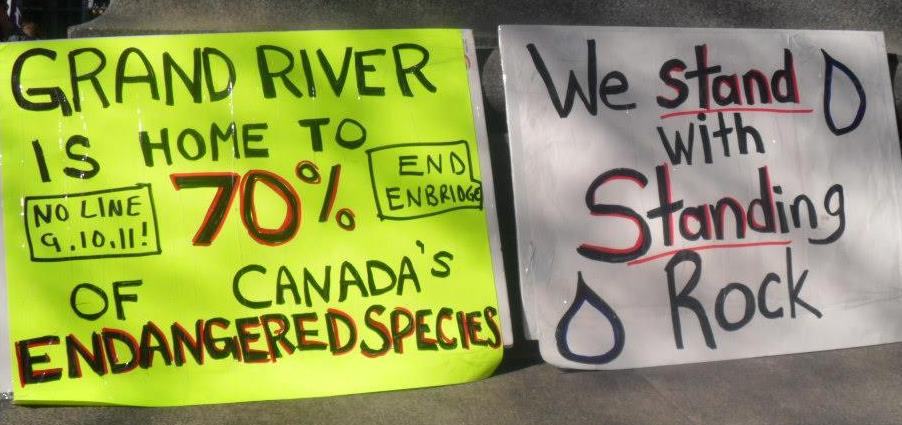
Montreal, November 7
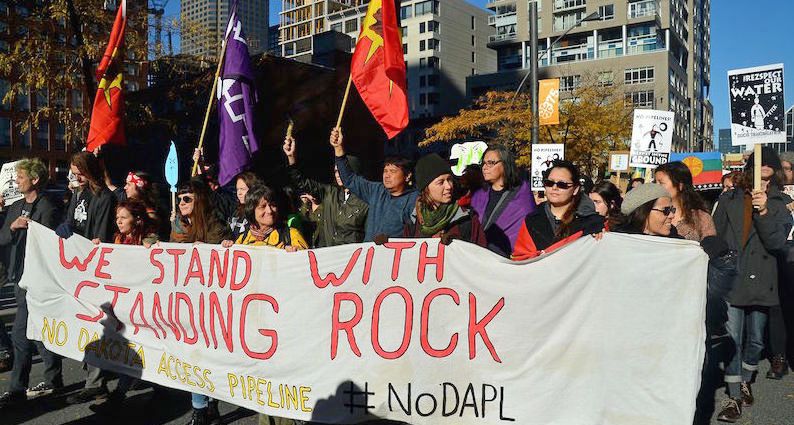 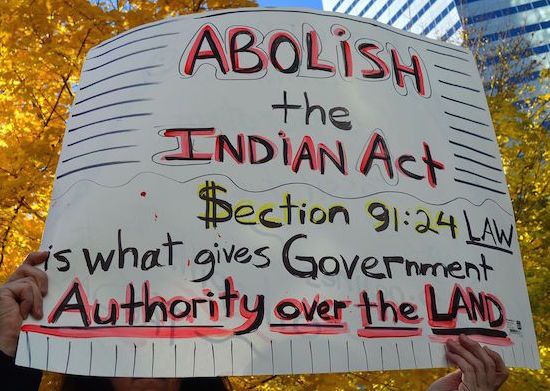 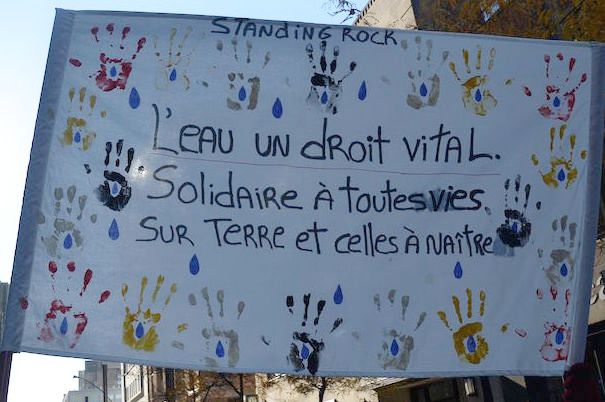
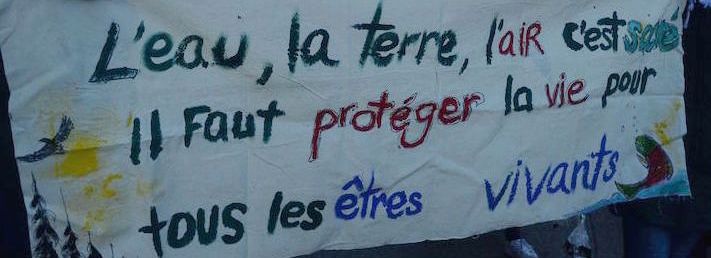
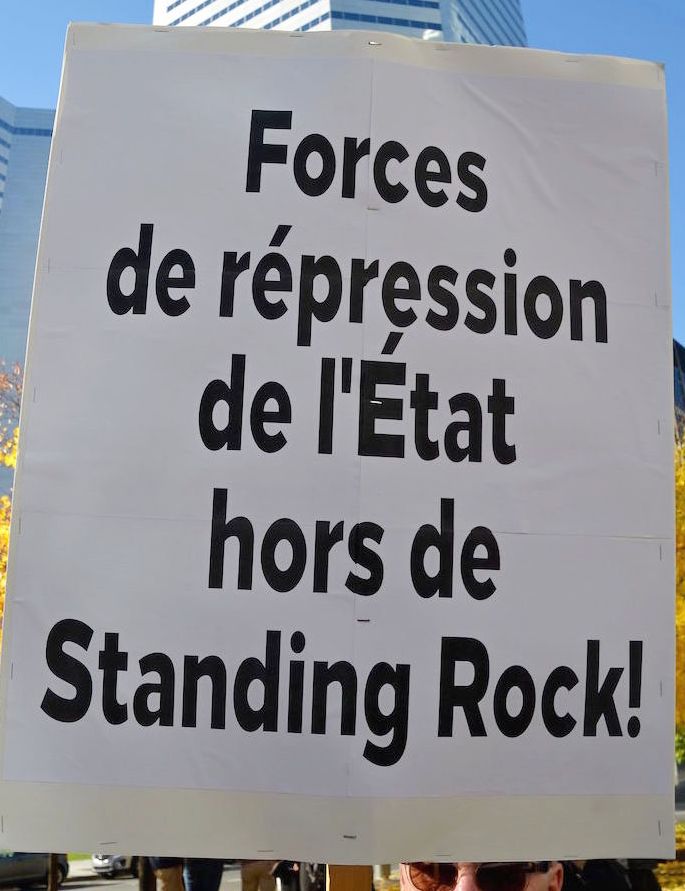 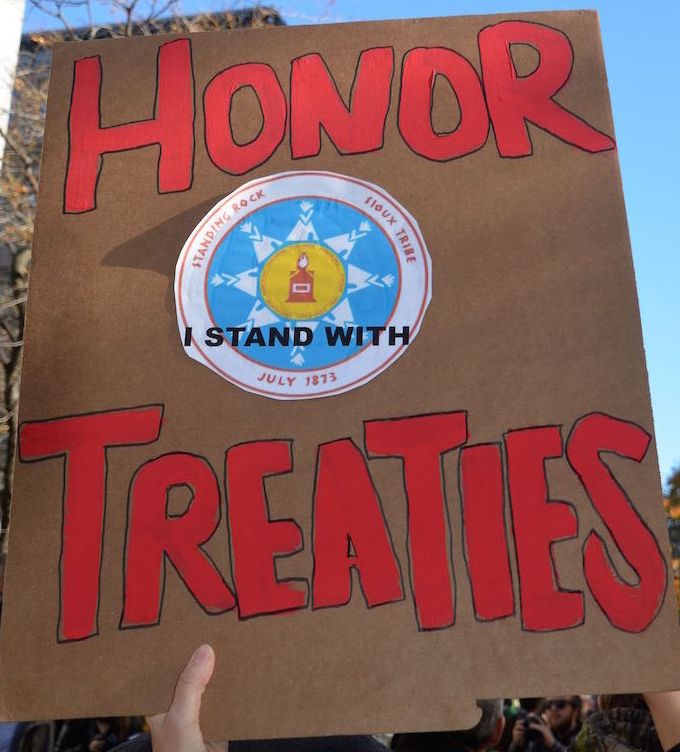 
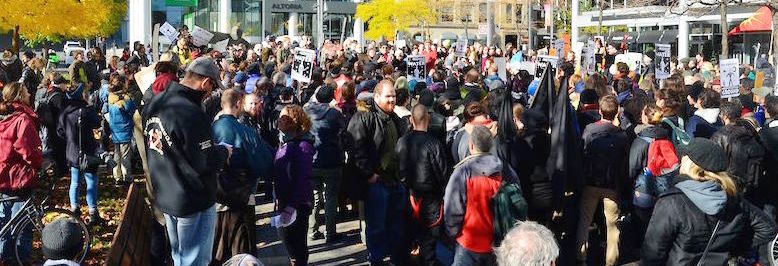
London, November 9
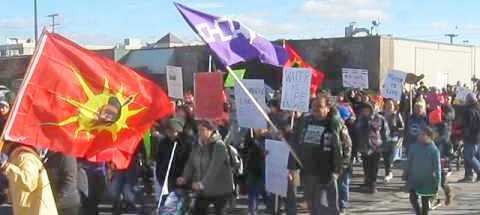
Montreal, November 15
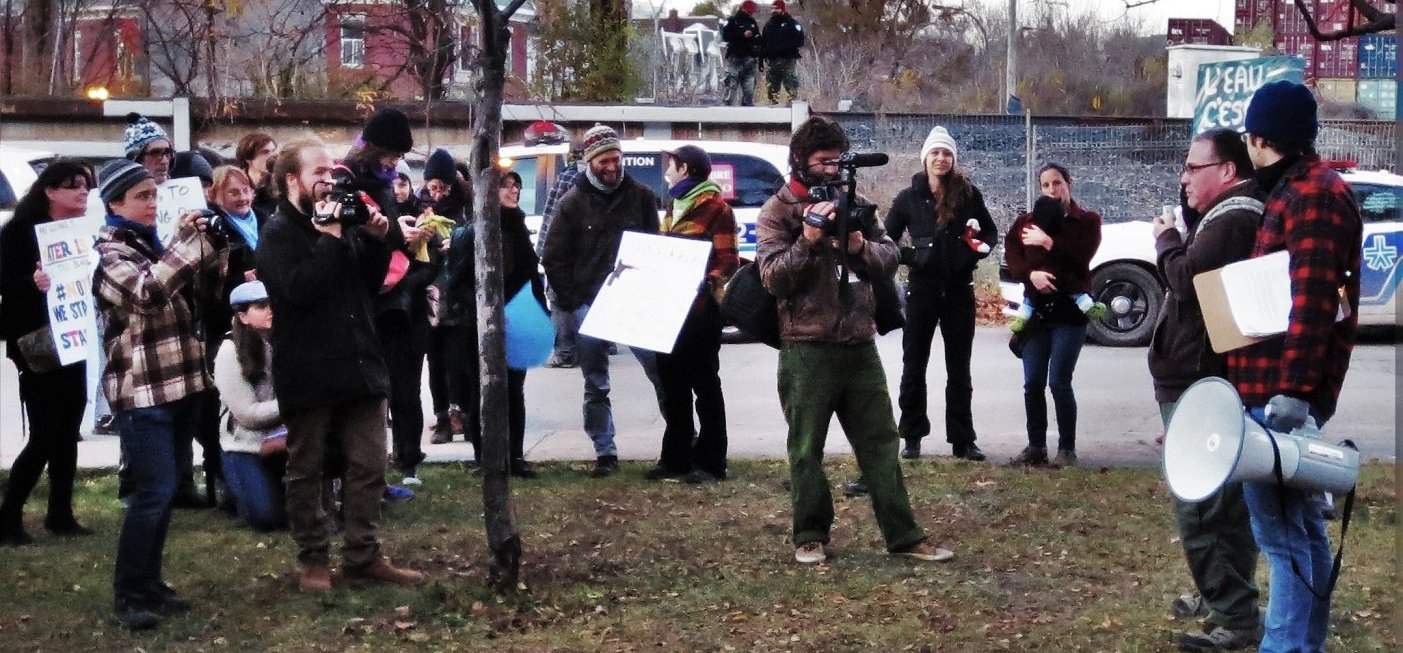
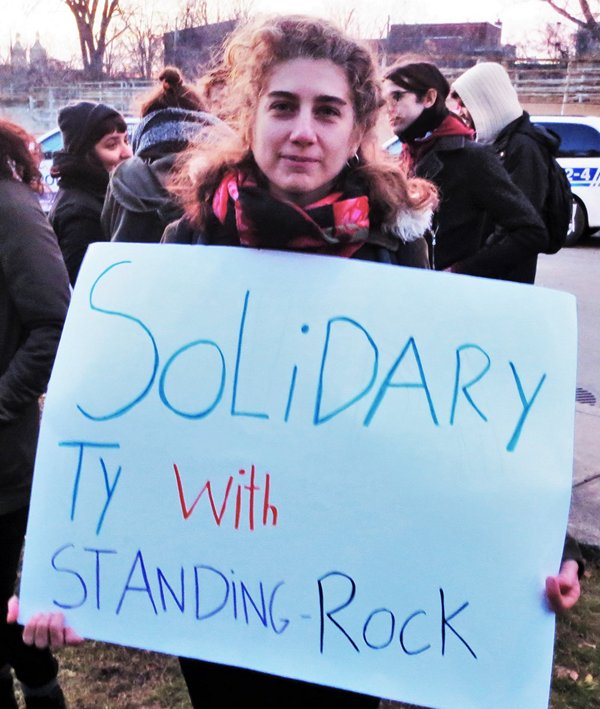 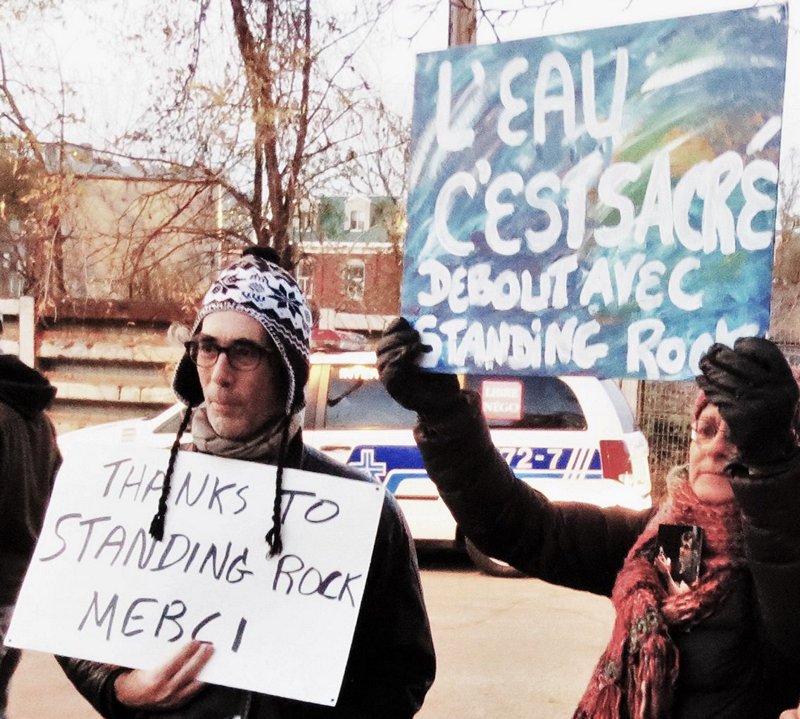
Six Nations on the Grand, November 16

Montreal, November 22
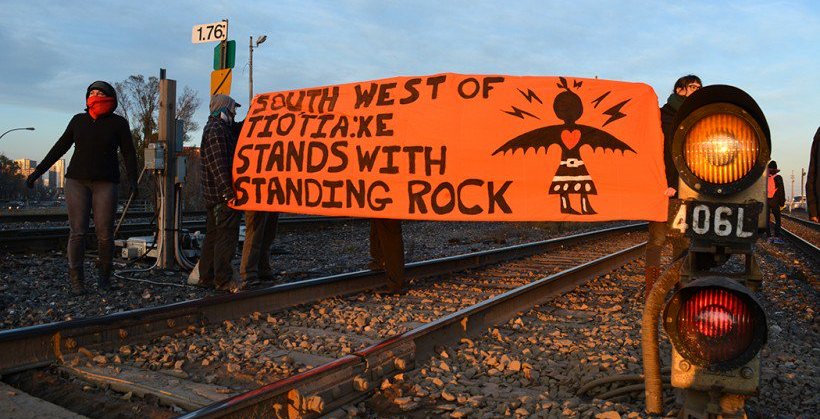
Montreal, November 23
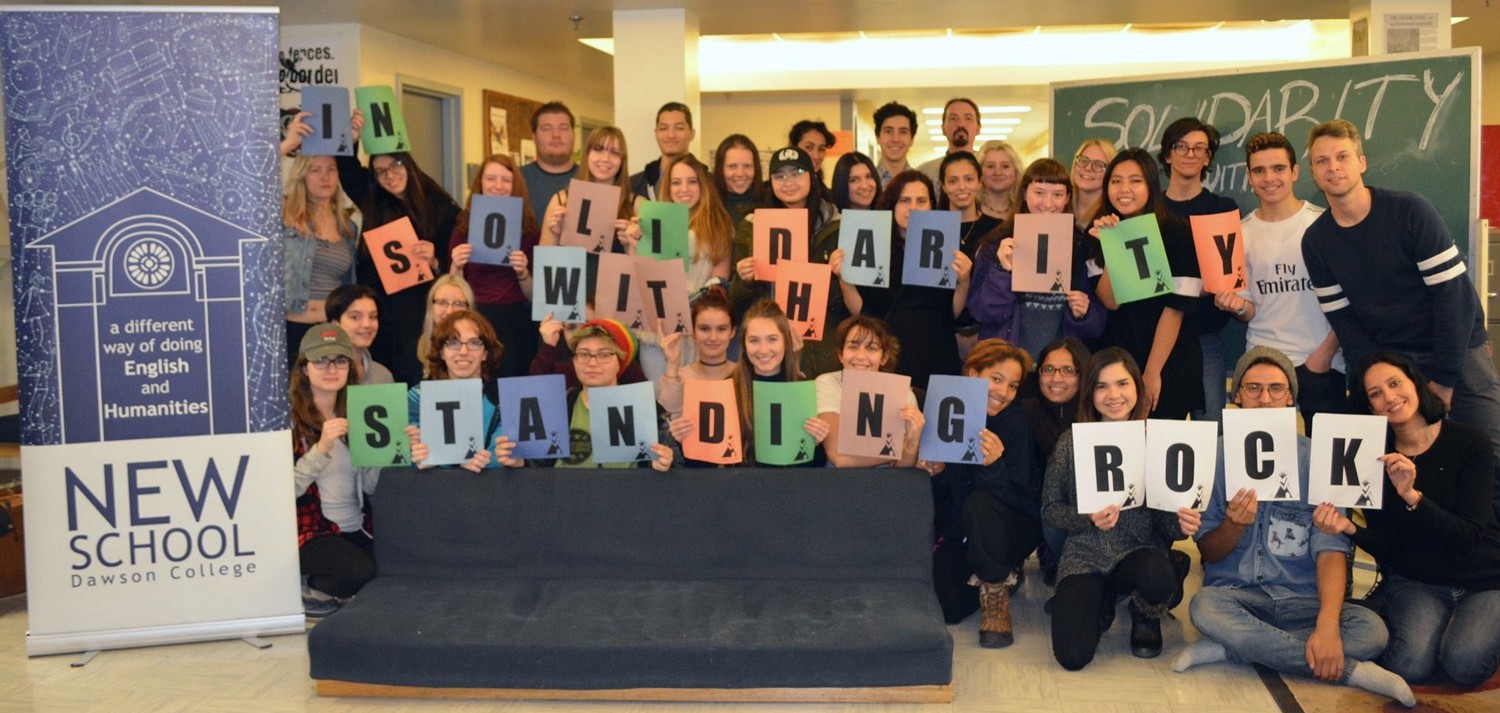
Montreal, November 24
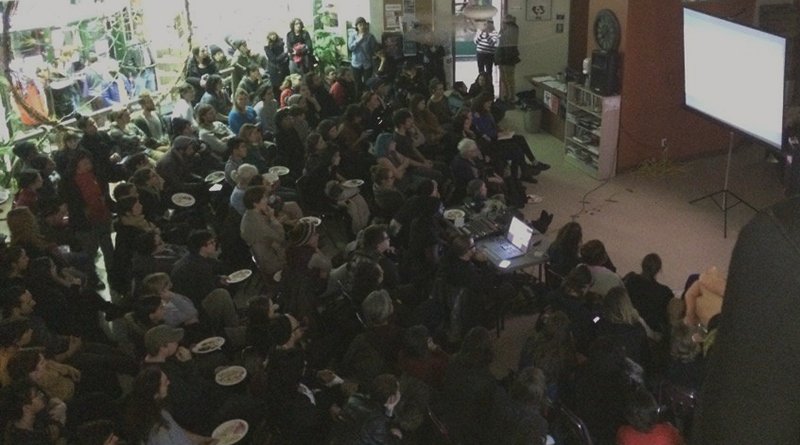 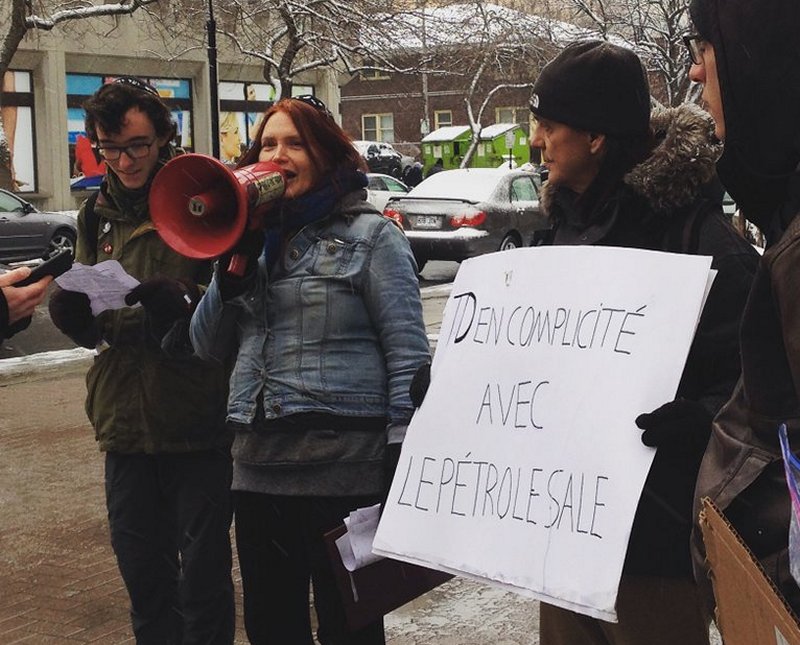

HOME
Website: www.cpcml.ca
Email: editor@cpcml.ca
|